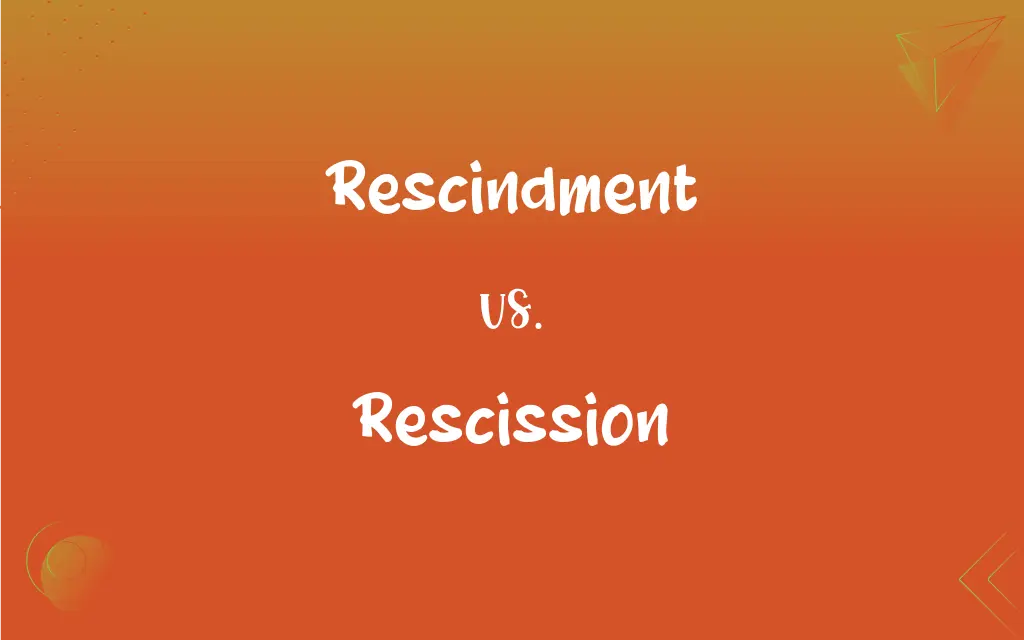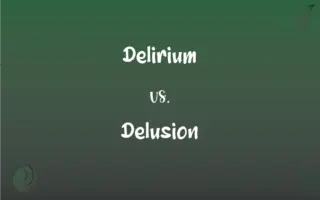Rescindment vs. Rescission: What's the Difference?
By Janet White || Updated on May 20, 2024
Rescindment refers to the act of rescinding or canceling something, whereas rescission specifically denotes the formal process of canceling a contract or agreement.

Key Differences
Rescindment is a general term used to describe the act of rescinding or nullifying something. It can apply to a wide range of contexts where an action, decision, or rule is revoked. On the other hand, rescission is a more specific legal term that refers to the formal cancellation of a contract, agreement, or law.
Rescindment can be seen in everyday situations, such as the cancellation of a decision by an organization or an individual retracting a statement. Whereas rescission is predominantly used in legal contexts, particularly in contract law, where it denotes the termination of a contract and the return of parties to their pre-contractual state.
In practice, rescindment might be used in casual conversations and non-legal documents to describe various forms of cancellation. Conversely, rescission is typically encountered in legal documents, court rulings, and formal agreements where precision and adherence to legal procedures are required.
The implications of rescindment are generally broader and less formal, potentially involving any form of cancellation or retraction. However, rescission carries specific legal implications, often involving restitution or compensation to restore the parties to their original positions before the contract was made.
While rescindment does not necessarily imply a legal process, rescission inherently involves legal recognition and processes to ensure the cancellation is legitimate and binding according to the law.
ADVERTISEMENT
Comparison Chart
Definition
Act of rescinding or canceling
Formal process of canceling a contract
Usage Context
General, everyday situations
Legal, contractual situations
Formality
Less formal
Highly formal
Legal Implications
Not necessarily involved
Involves legal procedures and implications
Restitution
Not typically required
Often involves restitution
ADVERTISEMENT
Rescindment and Rescission Definitions
Rescindment
The process of nullifying an action.
The board discussed the rescindment of the previous vote.
Rescission
Legal cancellation of a contract.
The court approved the rescission of their agreement.
Rescindment
The act of canceling a decision.
The rescindment of the policy was announced today.
Rescission
Legal undoing of a transaction.
They sought rescission after discovering the defect.
Rescindment
Withdrawal of a statement or offer.
The rescindment of his offer left everyone surprised.
Rescission
Formal termination of an agreement.
The rescission was necessary due to fraud.
Rescindment
Revocation of an order or directive.
The rescindment of the order came unexpectedly.
Rescission
Annulment of a legal document.
The lawyer filed for rescission of the deed.
Rescindment
Annulment of a rule or regulation.
The rescindment of the outdated regulation was welcomed.
Rescission
The act of rescinding.
Rescindment
To make void; repeal or annul.
Rescission
(Law) The termination of a contract by mutual agreement or as a result of fraud or some legal defect.
Rescindment
The act of rescinding.
Rescission
An act of rescinding: removing, taking away, or taking back.
Rescindment
The act of rescinding; rescission.
Rescission
(legal) The undoing of a contract; repeal.
Rescission
The act of rescinding, abrogating, annulling, or vacating; as, the rescission of a law, decree, or judgment.
Rescission
(law) the act of rescinding; the cancellation of a contract and the return of the parties to the positions they would have had if the contract had not been made; recission may be brought about by decree or by mutual consent
Rescission
Revocation of a contractual obligation.
Rescission of the contract returned them to their prior status.
FAQs
Is rescindment a legal term?
No, rescindment is a general term and not necessarily legal.
Can rescindment be used in legal contexts?
It can be used but is less precise compared to rescission.
What is the main difference between rescindment and rescission?
Rescindment is a general cancellation, whereas rescission is a formal legal process.
Does rescindment require a legal procedure?
No, rescindment does not necessarily involve a legal procedure.
Is rescission reversible?
Yes, rescission aims to reverse the effects of a contract.
What is rescission in legal terms?
Rescission is the formal legal process of canceling a contract.
Can rescindment be used in everyday language?
Yes, rescindment is commonly used in everyday situations.
Are there financial implications in rescission?
Yes, rescission often involves restitution or compensation.
Is rescindment formal or informal?
Rescindment is generally less formal.
What does rescindment mean?
Rescindment refers to the act of rescinding or canceling something.
Is rescission applicable outside the legal field?
Rescission is predominantly a legal term.
Does rescindment have a specific process?
No, rescindment does not have a specific legal process.
Does rescindment imply fault?
Not necessarily; it simply denotes cancellation.
What contexts is rescission commonly used in?
Rescission is commonly used in legal and contractual contexts.
Can rescindment be temporary?
Yes, rescindment can be temporary depending on the context.
What happens after rescission?
After rescission, parties are typically restored to their original positions.
Do both terms involve nullification?
Yes, both terms involve the act of nullifying something.
Is rescission a common legal remedy?
Yes, rescission is a common legal remedy for contract disputes.
Why might someone seek rescission?
Someone might seek rescission due to fraud, misrepresentation, or breach of contract.
Can rescindment apply to policies?
Yes, rescindment can apply to policies, decisions, and rules.
About Author
Written by
Janet WhiteJanet White has been an esteemed writer and blogger for Difference Wiki. Holding a Master's degree in Science and Medical Journalism from the prestigious Boston University, she has consistently demonstrated her expertise and passion for her field. When she's not immersed in her work, Janet relishes her time exercising, delving into a good book, and cherishing moments with friends and family.































































